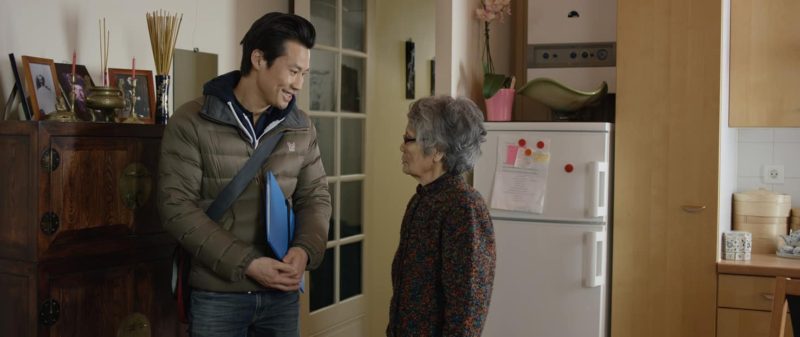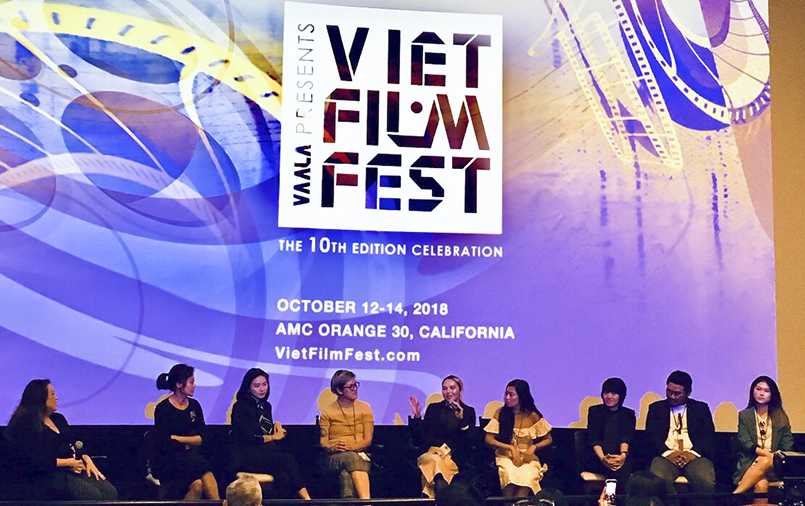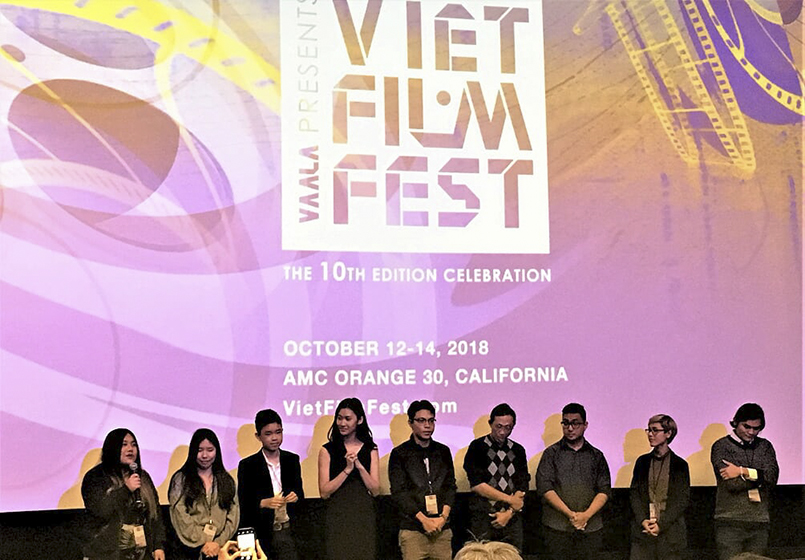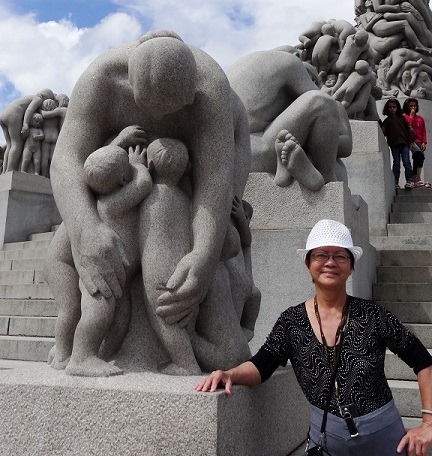A new contributing writer to diaCRITICS, Trùng Dương is well-known and established as a writer/journalist of the first-generation South Vietnamese diaspora. Our first story by Trùng Dương for diaCRITICS is her coverage of Viet Film Fest/VFF 2018, now in its tenth year of programming and organized by VAALA (Vietnamese American Arts and Letters Association).

Diverse lives of Vietnamese across the world
An elderly Vietnamese widow has confined herself for three years inside an apartment in France following her husband’s death, until a young male social worker of Vietnamese descent chances into her life. Despite her resentment toward his inability to speak her language, she eventually softens toward him, and even lets him take her on a spring outing in her red áo dài that she has not touched for years. The interaction with the nostalgic woman awakens the young man’s long-ignored parental heritage as he plans to visit Vietnam for the first time. (Spring Leaves/Feuilles de Printemps, Stephane Ly-Cuong, France, 2015, 13 minutes)
A young single Vietnamese mother lives with her pre-teen daughter somewhere in the Czech Republic. While eager for her daughter to assimilate into their new society, the mother also feels alienated from the life her daughter is embracing, including having a boy as friend and preparing their little flat with Easter decorations. (Easter, Chih Chieh Wu, Czech Republic, 2017, 10 minutes)
A Vietnamese father runs a grocery store in Germany to provide for his son who is supposed to study in Berlin, but who has dropped out instead, wanting to open a fitness center with a German friend and helper at the store. Upset, then fallen ill and hospitalized, the father finally comes to his senses, agreeing to sell his business and even his beloved car, so the son can make his own dreams come true. (Apples and Oranges/Obst & Gemuse, Duc Ngo Ngoc, 2017, 30 minutes)
Another Vietnamese father who lives in the United States is, however, not that lucky. His teenage son dreams of becoming a musician. However, like many Asian parents who have gone through hardships to rebuild their lives and want better for their children, the father has another dream for his son–to study hard, get admitted to a prestigious university, and become a medical doctor or pharmacist or engineer. When the son fails a college admission, the furious father confronts him and slaps him hard. Unable to cope, the teen decides to jump to his death. The last scene shows a boy walking off happily playing on his guitar. (The Broken Bond, Chau Hoang, Uy Do and Alena Nguyen, USA, 2018, 10 minutes)
When the local authorities wanted to develop tourism in the scenic World Heritage Site of Ha Long Bay, in the name of environmental protection they relocated the floating villages whose residents had lived there for several generations. Among those residents is Nguyen Van Cuong, his wife, and a teenage son. Each family was given a newly-built house on land. But there was no job re-training for the displaced. Eventually, unable to deal with problems arising from urban life, about half of the families returned to Ha Long to live illegally in small boats. The family of Cuong is among them. (Farewell Ha Long, Duc Ngo Ngoc, Germany, 2017, 98 minutes)
These are just a few of the 30 films (selected among 61 submitted, and consisting of 13 features, 17 shorts) presented at the 10th Viet Film Fest at the AMC 30 in Orange, Southern California, Oct. 12-14. The films reflect the diverse lives of Vietnamese across the world, an aspect of the film festival that has become the event’s signature.
A focus on Vietnamese women filmmakers
The three-day, all-volunteer event is organized by the 27-year-old Vietnamese American Arts and Letters Association (VAALA) as part of community programs. The films are, per VAALA criteria, either made by Vietnamese in the diaspora from across the world or from Vietnam, or by foreign filmmakers on a Vietnamese topic. This year, the countries represented at the festival included Canada, Czech Republic, France, Germany, Malaysia, Vietnam, United Kingdom and the United States.

The program was packed with a total of 16 screening sets, some overlapping another, making it a bit hard for someone who may’ve wanted to screen all 30 films. Each set consisted of a collection of films, short and long, grouped under a subject or a film title, and each ended with a Q&A session.
On the first day, a Friday, there were two sessions free to two groups, high school students and seniors, labeled according to each group’s interest, “Love in its many forms” and “Family dynamics in the diaspora,” respectively. The films shown included nine shorts, from just five minutes to 30 minutes, three of which are summarized above.
A fourth-time VFF goer, I couldn’t help but notice that the high school session in the morning was sold-out, with many in the audience having to stand, and the room filled with youthful interaction; the afternoon screening for seniors, however, was sparse, unlike in the few previous festivals. This tells of the sad fact that the audience of first generation Vietnamese immigrants has slowly thinned out. Not many attended either a special screening on the fest’s third day of a pre-1975 feature film, Chân Trời Tím/The Purple Horizon, a love story set during the war, by South Vietnamese director Lê Hoàng Hoa, and starring the famous actors Hùng Cường and Kim Vui, with the latter, now in her 80s, also in attendance.
It’s interesting also to notice that most of the feature films that came from Vietnam explored mostly light-hearted stories, presumably to avoid censorship while appealing to the younger generation. These included a love story (Summer in Closed Eyes/Nhắm Mắt Thấy Mùa Hè, 2018, directed by Cao Thuy Nhi; filmed in Vietnam and Japan); a youth-oriented comedy of a young man’s first love (The Girl From Yesterday/Cô Gái Đến Từ Hôm Qua, 2018, directed by Phan Gia Nhat Linh); and a remake of a hit South Korean film (Go Go Sisters/Tháng Năm Rực Rỡ, 2018, directed by Nguyễn Quang Dũng). Another feature set in the French colonial era explored a safer topic, about The Housemaid/Cô Hầu Gái (2016, directed by Derek Nguyen). Nguyen apparently made the film in Vietnam thanks to the lesser costs of available local support. He is not alone. Several U.S.-trained filmmakers have gone the same route, as in the case of director Nguyen Vo Nghiem Minh and his two feature films, Buffalo Boy (2004) and 2030 (2014). The latter was screened at the VFF 2015. (*)
Films made by overseas Vietnamese, meanwhile, are mostly short. Again, I guess, it’s a matter of funding. Two films considered features include Hanh, Solo (2017, 86 minutes), directed by Jason Taylor, starring Hanh Nguyen, who also co-wrote the script, about a week in the life of Hanh herself as she searches for purpose, having been disappointed in romantic love and professional life. The other is Actress Wanted (2018, 83 minutes), directed by Minh Duc Nguyen, about an aspiring actress who accepts an offer to star in a film reenacting the love story of the film producer with his late wife, set in Orange County’s Little Saigon. These films explore issues that tend to stay with the audience long after their endings.
This year more than fifty percent of films selected for the three-day festival were either directed or produced by women, according to the fest’s press release. “Many of them offer strong female characters and storylines that [are] often missing in mainstream Hollywood productions,” it states. “In a time period where #MeToo and #OscarsSoWhite movements dominate the public conversation, Vietnamese female filmmakers are proving to be leaders in fighting against the status quo.”
Indeed, the Vietnamese Women in Film: The Power of Stories Panel, which took place on the fest’s second day, attracted a large audience. It showcased seven women who have contributed to the motion picture art. They included: Pham thi Hong Anh of Vietnam, a dancer-turned-film-actor-turned-director of The Way Station/Đảo Của Dân Ngụ Cư (2017) which screened at the fest; Ngo Thanh Van of Vietnam, a model-turned-actor-turned-producer of Cô Ba Sài Gòn, a feature playing at Regency Theaters Westminster 10 in Westminster, Calif. at the end of October; Quyen Nguyen-Le, USA, co-director of The Labyrinth (2015), and Nước, a short screened at the fest; Loan Hoàng, USA, a dancer of California-based Hip Hop Choreography Team Academy Of Villains; Hanh Nguyen, USA, of Hanh, Solo; Cao Thuy Nhi, Vietnam, director of Summer in Closed Eyes, opening-night feature film and winner of the VFF Spotlight Award; and actress Ngoc Thanh Tam, Vietnam, star of Pham thi Hong Anh’s The Way Station.
These women shared their journey into the film industry, their struggles and challenges, including discrimination, but each with a burning passion that helped keep them in the game. The more experienced and perhaps most established ones, such as Pham thi Hong Anh and Ngo Thanh Van, offered some heartfelt encouragements.

“Most important of all in my message for women is to find stories that carry aspects of Vietnamese culture,” said Ngo Thanh Van, who spent ten years in Norway absorbing its culture before returning to Vietnam at the age of 19, and who now leads a film production company. “We Vietnamese women are often told what you can do. Ask yourself what you want to do [and] what is your dream? Then do it with a passion and responsibility to somehow reflect true Vietnamese lives on screen for all to see.[…] We, as women, we can do anything if we so want, if we have the passion and tenacity. Don’t be afraid.”
The only full-length documentary screened at this year’s fest was Farewell Ha Long, directed by Duc Ngo Ngoc from Germany (98 minutes). During the Q&A session following the screening, Ngo said he made several visits and spent time each visit drinking, or nhậu, for days with the locals, in order to gain their trust. He and his crew followed Nguyen Van Cuong’s family and other villagers from the time their floating village still existed, until it was dismantled and its residents relocated to a newly-built housing complex on land. When urban problems drove Cuong’s family, along with more than half of the displaced, back to Ha Long Bay to live as illegals on the very waters they were born and grew up on, Ngo and his crew followed them.
Farewell was supposed to premiere last June in Ha Noi and Sai Gon. However, it was banned by the Ministry of Culture. The reason: “The permission to film/shoot of thefilm … pertained for reportage only. The film is not suitable for a presentation in Vietnam at the moment,”the ministry declared.
Also packaged in the set about the displaced, titled after Farewell Halong,was a 10-minute documentary Limbo/Bị Kẹt (2018) by Lan Nguyen and David Luu, featuring the case of Tung Nguyen, a Soros Justice Fellow and community organizer in Orange County, Calif. Tung is among over 8,600 Vietnamese American on the federal Final Removal Order at risk of being deported.
When he was a teenager, Tung committed crimes for which he served his time. He has since turned around and become a community leader, helping others fight against unjust detention and deportation. His future now hangs in the balance. Tung’s best chance is a pardon from Governor Brown, which would make him eligible to reopen his immigration case and petition for legal status. (Contact Tung at [email protected] to help or learn more.)
Youth In Motion
With so much focus on mature filmmakers, either professional or amateur, it would be unfair not to mention the Youth in Motion: A Workshop for Emerging Filmmakers program. This is a way for VAALA to inspire future filmmakers, by acquainting youth with the process of filmmaking, which at the same time provides teenagers with a creative channel for expressing themselves.
While other VAALA members were busy receiving and screening films for the festival as early as April, the two young women charged with running the YIM, Tu Nguyen, a videographer,and Uyen Hoang, a UCLA graduate in Asian American Studies and Public Health, busied themselves withguidingyouth filmmakers in exploring and learning basic skills and tools for digital filmmaking as well asworking collaboratively to produce short films.
This year’s youth program participants had their films screened in a separate set,titled Youth in Motion, that dealt with hot teenage issues such as depression, anxiety, suicide, among others. One of them, “The Broken Bond,” as summarized above, drew a dynamic discussion in the Q&A session. The film, co-directed by Chau Hoang, Uy Do and Alena Nguyen, lasts just 10 minutes but sends a tremendous message to Asian parents who tend to push their kids to achieve beyond their abilities and oftentimes against their own wills and dreams. The fictional theme is not exaggerated if we remember that a decade ago a tragic incident actually took place in Orange County, when a young man, Son Lam Nguyen, unable to take his mother’s pressuring him to become a medical doctor, strangled her to death.
The Broken Bond was the brain child of Chau Hoang and Uy Do,” said Tu Nguyen in an e-mail interview. “They wrote and directed the entire film together and created something quite impressive. Neither of them had made a film before.”

As a result of the YIM experience, according to Tu Nguyen, “Uy did recently switch his undergraduate major to film, while Chau has experience with photography. Because of their pre-existing interests in filmmaking they wanted to push their creativity and also dedicated a lot of hours outside of the workshop to make their film a reality.”
“This is the first year that Uyen and I began directing Youth in Motion,” Tu Nguyen said of her and her co-director Uyen Hoang. “We were asked to come back next year and are excited to continue growing and improving the program. Uyen and I bring different but complimentary skillsets to the program. She has a lot of experience teaching and faciliating large groups. […] I act as the tech advisor and will lend a helping hand on the participant’s film sets if needed. Uyen and I work closely to design the program’s curriculum and act as facilitators at every session. We hire instructors, mostly Vietnamese-Americans professionals, to lead workshops like lighting, storytelling, camerawork, and editing.”
“After directing this year’s Youth in Motion, we have a lot of ideas for ways to expand and improve it for next year, so please watch out for us in 2019 [October 11-13]!” Tu Nguyen concluded.
Note:
(*) A review of “2030” is included in Trung Duong’s report, in Vietnamese, of the Viet Film Fest 2015, “Vài nhận xét về Đại hội Điện ảnh Việt Film Fest 2015,” for damau.org.
CONTRIBUTOR BIO

Trùng Dương, born Nguyễn Thị Thái, 1944 in Sơn Tây, North Vietnam. Emigrated to and grew up in South Vietnam from 1954. Former publisher-editor of the Daily Sóng Thần (Sài Gòn, 1971-75), she’s authored several short and long fictions, essays, illustrations, and a three-act play, My Sons Are Home (1978). A political refugee in the United States since 1975, she graduated from the State University of California, Sacramento with a BA in government-journalism and an MA in international affairs. A 1990-91 Fulbright Fellow in Hongkong, she studied China’s Special Ecionomic Zones. She reported for the Mountain Democrat, Placerville, Calif., 1991-93; then worked as copy editor then chief librarian at The Record, Stockton, Calif. until retiring in 2006. She now lives in Northern California.
Trùng Dương, tên khai sinh là Nguyễn Thị Thái, sinh năm 1944 tại Sơn Tây, di cư vào và lớn lên tại miền Nam từ 1954. Nguyên chủ nhiệm-chủ bút nhật báo Sóng Thần (Saigòn, 1971-75), bà là tác giả của nhiều truyện ngắn, truyện dài, biên khảo, phóng sự, minh hoạ, và một vở kịch ba màn, Các Con Tôi Đã Về (1978). Tị nạn cộng sản tại Hoa Kỳ từ 1975. Sau khi tốt nghiệp cử nhân và cao học ngành báo chí, công quyền và các vấn đề quốc tế, Đại học Tiểu Bang California, Sacramento, bà làm phóng viên cho tờ The Mountain Democrat, Placerville, Calif., từ 1991-93; sau đó về cộng tác với nhật báo The Record, Stockton, Calif., làm copy editor rồi trưởng thư viện tin tức (chief news librarian) từ 1993 tới khi về hưu năm 2006. Bà hiện cư ngụ tại Northern California.


